
Starting a relationship blog offers you the chance to earn money while sharing meaningful advice on love, relationships, and personal growth.
The best part is that? You don’t need to be a relationship expert to start a successful blog. All you need is your interest in understanding others, a desire to learn, and the motivation to share your personal experiences and tips in a relatable, engaging way.
Every successful relationship blog began with one post, yours could be the next one to take off!
Why You Should Start Your Relationship Blog Today
- Minimal Time & Cost to Start: Get your blog up and running in under 10 minutes for as low as $3.50/month, with no big investment required.
- Earn $3,000 – $12,000 per Month: Create a full-time income by sharing your relationship tips and advice, all on your terms and from the comfort of your home.
- No Coding Required: Don’t worry about being tech-savvy! With pre-built templates, you can easily customize your blog to reflect your personal style.
- Monetize Your Blog Fast: Start earning immediately with display ads and affiliate marketing—no huge following needed, just great content!
- Attract Global Traffic: Your blog will resonate with people worldwide who are looking for relationship advice, stories, and tips that speak to them.
- Paid Brand Partnerships: As your blog grows, companies will reach out for paid collaborations to promote their products and services.
- Accessible Anywhere: Whether you’re in the U.S., Europe, or anywhere else, you can start and grow your relationship blog from anywhere at any time.
Many small to medium-sized relationship bloggers are making $12k+/month. Why not you? It may take time, but with consistency, you can turn your blog into a very profitable venture, sharing your knowledge on relationship and dating tips.
What You Need to Get Started
Here’s everything you need to get your relationship blog set up and ready for your first post:
- A Desktop or Laptop: You’ll need a computer to manage your site and write your posts efficiently.
- A Domain Name: Choose a name that reflects your blog’s niche or your personal style.
- A Blogging Platform: This is where you build and manage your blog site. WordPress.org is one of the best blogging platforms, also known as a content management system (CMS), where you customize your site and create new posts and pages. You can use pre-built blog site templates to get started without needing to code at all.
- Web Hosting: This service keeps your blog online and accessible. You can start with a reliable web hosting provider like HostGator, which also offers a free domain name of your choice.
Once you sign up with a hosting provider (e.g., HostGator), you’ll be able to easily install WordPress and start building your blog!
Affiliate Disclosure: This post may include affiliate links with special discounts. Using them saves you money and supports our site at no extra cost to you. Win-win right! Check out our [Privacy Policy] for more details. Thanks for your support!
How to Start a Relationship Blog Step-by-Step
Start Here: Follow the instructions below to Get Started
I’ll be using HostGator as they are one of the best options for beginners.
- Step 1: Start within a sub-niche under the relationship blogging space
- Step 2: Click on HostGator to get started
- Step 3: Choose your HostGator hosting plan
- Step 4: Pick a unique domain name of your choice
- Step 6: Choose your preferred hosting subscription period
- Step 6: Create your HostGator account
- Step 7: Install WordPress In your HostGator Account
- Step 8: Within your WordPress, select your blog theme [A Pre-built Site]
- Step 9: Customize your site layout, create your main pages, and start publishing blog posts.
Step 1: Choose a Sub-niche With Your Niche
Starting within a sub-niche is all about finding one of the main content categories under the relationship blogging space to start publishing its category-related content and gradually expanding to other sub-niches to find more content ideas.
Below are some profitable sub-niches in relationship blogging where you can start from:
- Dating Advice Niche – Focuses on tips for finding, meeting, and attracting potential partners, dating etiquette, and relationship-building for singles.
- Marriage and Long-term Relationships Niche – Provides advice on maintaining and strengthening long-term relationships or marriages, dealing with challenges, and building emotional intimacy.
- Parenting and Co-parenting Niche – Covers relationship dynamics between parents and the challenges of co-parenting, including advice on communication, conflict resolution, and raising children together.
- Divorce and breakup niche – Focuses on handling breakups, divorce recovery, rebuilding life post-divorce, and co-parenting after separation.
- Relationship Communication – Offers guidance on improving communication skills between partners, managing conflict, and fostering understanding and empathy.
- Friendship and Social Dynamics – Explores maintaining healthy friendships, navigating social circles, and resolving issues with friends.
Relevant – Relationship-related Blog Topic Ideas
Step 2: Click on “HostGator” To Get Started
You can get started by using our discount link to get HostGator for less than its original price.
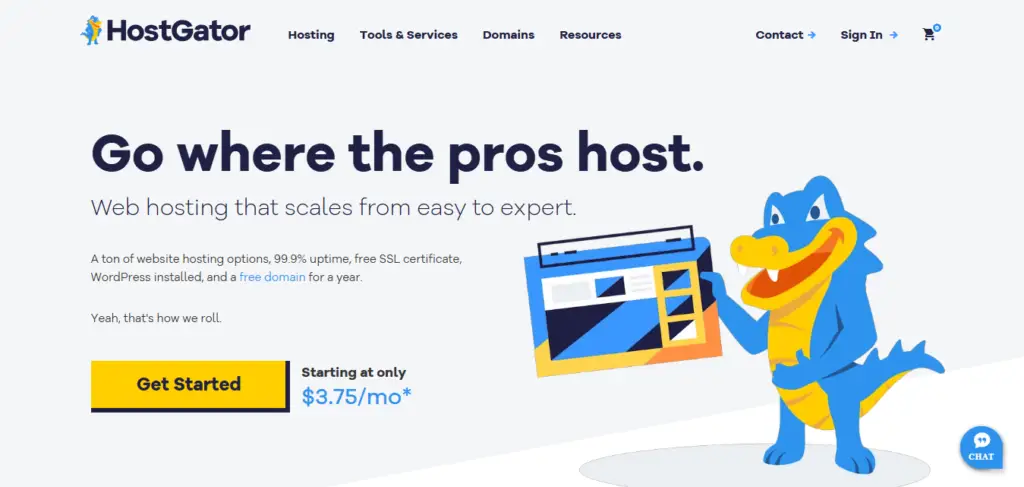
Relevant – Here are other great web hosting providers you can consider as well.
Step 3: Choose Your Preferred HostGator Plan
Selecting the HostGator hatchling plan is more advisable for beginners with a limited budget. After all, you can upgrade your hosting plan when your blog starts making money.
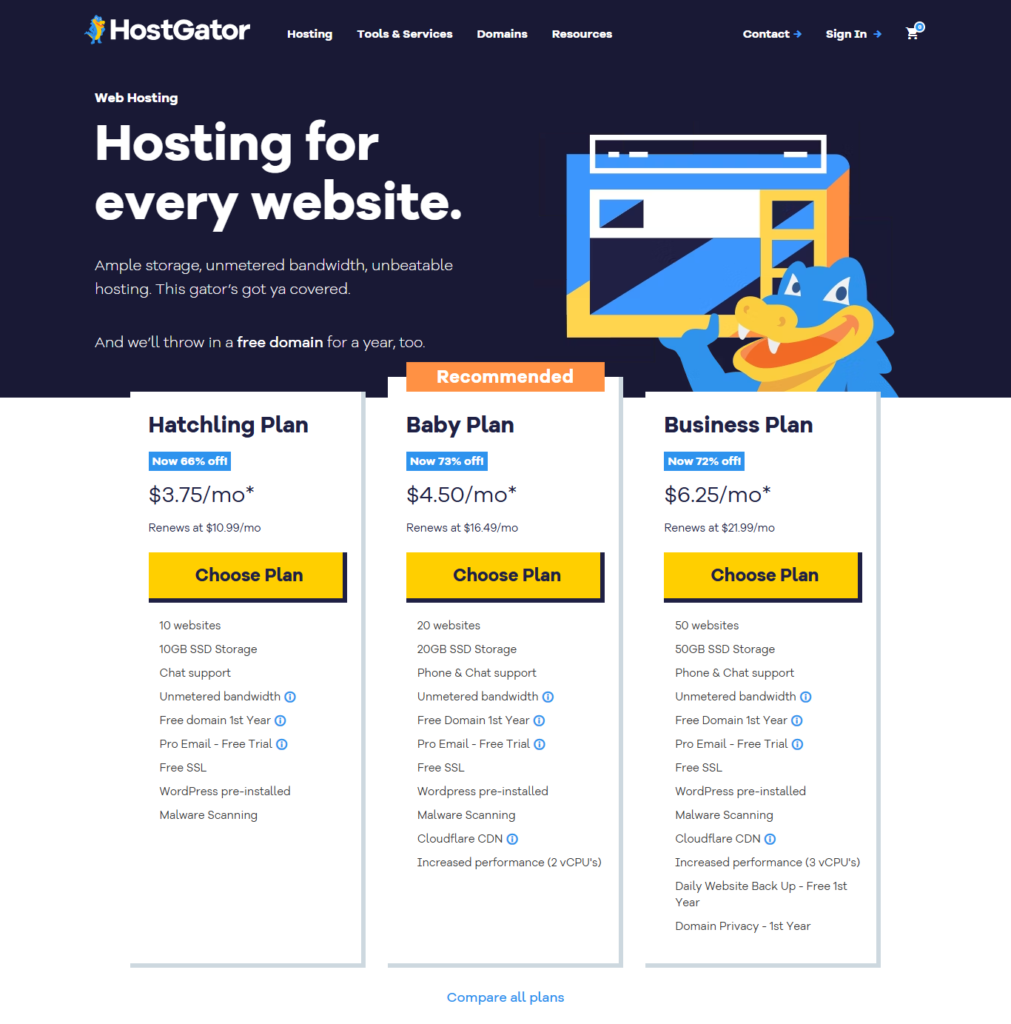
Step 4: Pick a Unique Domain Name For Your Blog
After you’ve selected your hosting plan above, you will be directed to a page like this below to choose your blog’s domain name and complete your sign-up.
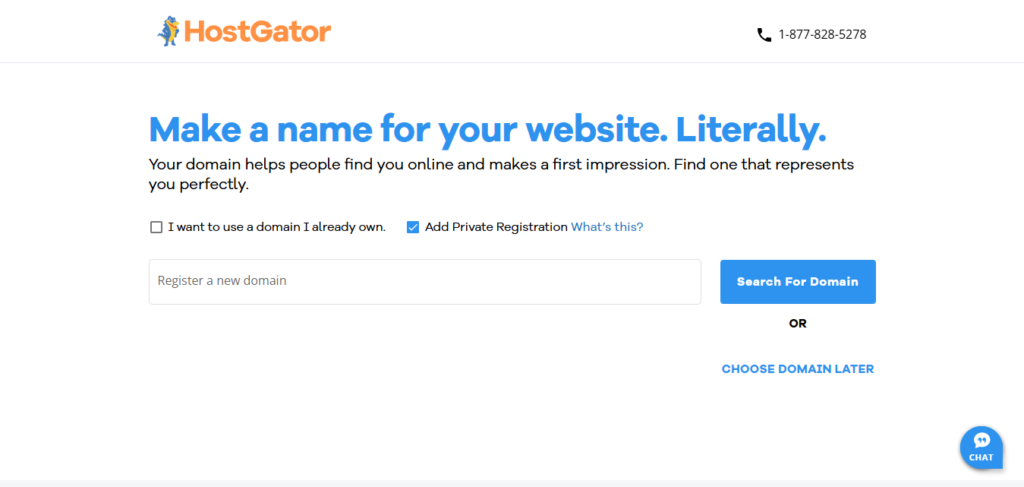
What to consider when choosing your blog domain name
- Make it Memorable and Easy to Spell: Your domain name should be simple, catchy, and easy to type. Avoid complicated spellings or unnecessary hyphens that could confuse visitors.
- Reflect Your Niche: Let your domain name give a clear hint about your blog’s focus—whether it’s about love advice, relationship tips, or personal stories. Incorporate keywords that are related to relationships or dating.
- Keep it Short and Sweet: Aim for a domain name between 6-14 characters. Shorter names are easier to remember and type into a browser.
- Easy to Read and Pronounce: Choose a name that’s easy to pronounce and read. Avoid tricky letter combinations or double letters that could make it difficult for people to say or recall.
Relevant List – 150+ Unique Dating And Relationship Blog Name Ideas & Their Meanings
Step 5: Adjust Your Hosting Subscription Period
Ensure you’re on the Hatchling Plan on the right side of the page. Then, select your preferred subscription period, either 1 year or 36 months, based on what fits your budget at the moment..
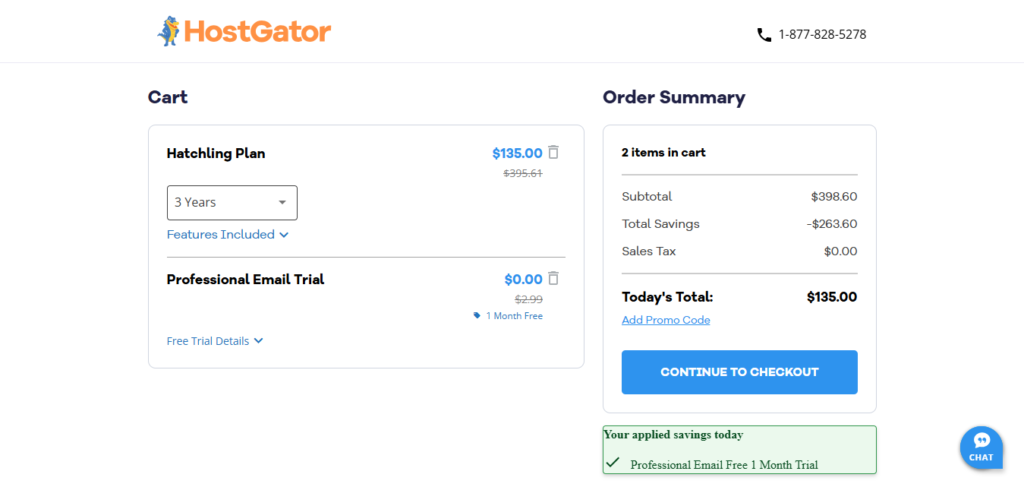
Step 6: Create Your HostGator Account
Sign up for your HostGator account by entering your email address and selecting a strong password.
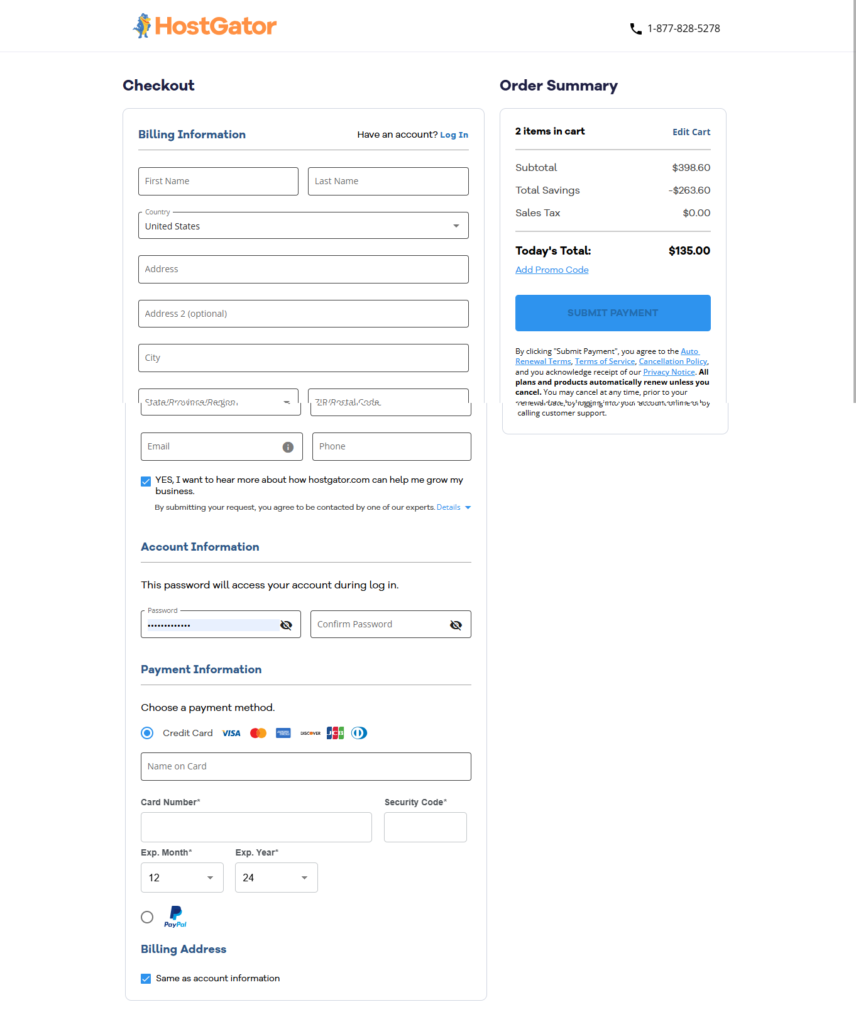
Double-check all the details you’ve entered to make sure everything is correct. Once you’re sure, proceed to checkout and finalize your purchase.
Step 7: Install WordPress Within Your HostGator Account
After completing your HostGator sign-up, follow the on-screen instructions to finish setting up and installing WordPress.
Alternative Method:
- Log in to your HostGator account.
- Find the “WordPress” section in your dashboard.
- Click on it to begin creating your WordPress account.
Once your account is set up, you’ll be automatically logged into WordPress, ready to start customizing your blog!
Step 8: Choose Your Blog Theme Within WordPress
Now it’s time to make your relationship blog look and feel exactly how you want it! WordPress themes are pre-built website templates, and you can easily select, preview, and customize one that suits your blog’s vibe.
Here’s a quick guide to choosing the perfect WordPress theme for your relationship blog:
- Navigate to Themes – In your WordPress dashboard, go to Appearance > Themes to browse through the available options.
- Explore the Theme Library – Look for themes that focus on relationship topics or have features like blog layouts, responsive design, and customization options.
- Filter Your Options – Use filters to find themes with social media integration, easy navigation, and features like image sliders. Aim for a layout that feels warm, inviting, and easy to read.
- Preview Before Committing – Click Preview to see how the theme will look with your content, and make sure it’s mobile-friendly.
- Check Reviews and Ratings – Read through user reviews to find out about the theme’s ease of use and any potential issues.
- Mobile-Friendly Is Key – Make sure your theme looks great on all devices to reach a wider audience.
- Consider Paid Themes – If free themes don’t meet your needs, a premium theme could offer more design flexibility. Only consider this option if you’re comfortable with WordPress.
Popular Themes for Relationship Blogs:
- Astra – Fast, customizable, and responsive.
- Divi – Highly customizable with a visually appealing design.
- Zillah – Stylish and modern design.
Choose a theme that matches the personality of your blog and helps create an enjoyable reading experience for your audience!
Step 9: Customize Your Blog’s Main Pages and Start Publishing Posts
Now that you’ve selected a theme, it’s time to make it truly yours! You can use your theme’s customization options to adjust colors, fonts, and layouts that reflect your personal style and the message of your relationship blog.
- Customize Your Pages – Most themes come with pre-built layouts for essential pages like “About,” “Contact,” and “Home.” You can easily customize these to suit your voice and branding.
- Start Blogging – Once your pages are set, it’s time to start writing and publishing blog posts about relationship advice, tips, personal experiences, or anything else that will resonate with your audience.
Congratulations! At this stage, you’ve built a fully functional blog that’s ready to share your insights on relationships. Happy blogging!
Your site is now live and visible to readers on Google and beyond
Watch the video below to help make the process easier!
Watch this step-by-step tutorial to learn how to quickly set up your relationship blog with WordPress and HostGator. It covers everything you need to know, from installation to customization, so you can get your blog up and running in no time!
After you watch the video, you can follow the steps below to discover some engaging relationship-related blog topics to write about and get your blog up and running!
How to Find Relationship Blog Topics to Write About
Your blog setup is complete—now it’s time to publish blog posts that attract love-struck readers and paying advertisers. But what should you write about?
These tools and guides will help you unlock endless blog topic ideas and craft posts that rank well on Google and other search engines:
💡 Brainstorming Relationship Blog Topics
- 250+ Dating & Relationship Blog Post Ideas (Cheat sheet for beginners!)
- Relationship Blog Topic Generator (AI-powered ideas in seconds)
- How to Write Headlines That Make Readers Swipe Right (Your title = your first impression!)
✍️ Writing for Traffic & Trust
- The Step-by-Step Guide to High-Quality Blog Posts (Structure hooks that keep readers engaged)
- How to Hire a Pro Writer for Your Relationship Blog (When to outsource + where to find them)
📈 Advanced Strategies
- Keyword Research for Dating Blogs (Find low-competition questions like “How to fix trust issues?”)
- “Why Your Relationship Posts Aren’t Ranking” (Fix these blogging mistakes)
Pro Tip: Pair these resources with our Monetization Guide below to turn your blog posts into a money-making machine.
How To Monetize Your Relationship Blog And Make Money
1. Monetize Your Blog Posts With Ads
Google AdSense is one of the best ad networks, but there are other ad networks to explore.
Here’s How to Get Started with Ads:
Sign Up for Google AdSense:
- Visit Google AdSense and click “Sign Up”.
- Use your existing Google account (you likely already have one) to sign up.
- Enter your blog’s URL and provide some basic contact information.
- Google will review your site to make sure it follows its content policies. This typically takes a few days.
Pro Tip: It’s a good idea to have at least 10 to 30 blog posts live before you apply to speed up the approval process.
Add the AdSense Code to Your Blog:
- Once you’re approved, Google will provide you with a code to insert into your blog.
- This code will automatically display ads that are relevant to your content and your readers’ interests.
- You can place the ads anywhere on your blog (e.g., sidebar, header, footer). If you’re not sure how to add the code, most blogging platforms, including WordPress, have easy-to-use plugins to help you.
Start Earning from Ads:
- Google will automatically display ads based on your content and audience interests.
- You’ll earn money through CPC (Cost Per Click) or CPM (Cost Per Thousand Impressions), meaning you earn whenever someone clicks on the ads or views them.
- The best part? Once set up, ads will provide passive income while you continue creating content!
How Much Can You Make?
Earnings from ads vary depending on how much traffic your blog receives. Many bloggers make anywhere from $500 to $3,000+ per month from Google AdSense alone. While it takes time to build up traffic, the more content you publish and the more traffic you drive, the more your earnings can grow!
For More:
- How to increase your pageviews to increase your ad revenue
- How to increase your visitors’ retention time to increase ad income
2. Monetize Your Blog with Affiliate Marketing And Make Money
Affiliate marketing is a great way to earn income by recommending products or services that you use or know very well.
Since your blog focuses on relationships, there are tons of products that fit perfectly within this niche, relationship books, online therapy services, relationship courses, or even self-care items. With affiliate marketing, you earn a commission when someone clicks on your link and makes a purchase.
How to promote affiliate products on your blog
Find Your Niche Relevant Affiliate Programs:
- Look for affiliate programs that align with your blog’s focus on relationships. Some great programs include:
- Amazon Associates: You can promote relationship-related books, journals, self-care products, and other relationship tools.
- BetterHelp: This is a popular online therapy platforms that offer affiliate programs. Promoting therapy services is a great way to help readers who may be struggling and earn a commission.
- ShareASale: This network has various relationship-focused programs, including online courses, books, and other resources.
- Couples’ Retreats or Relationship Courses: Many relationship coaches and companies offer affiliate programs. These can be a great fit for readers looking to improve their relationships.
Find More Here: Dating & Relationship Affiliate Programs
Sign Up for Affiliate Programs:
- Head to the program’s website and apply to become an affiliate. You’ll likely need to share some details about your blog, like your audience size and content focus.
Get Your Affiliate Links:
- Once you’re approved, you’ll get unique affiliate links that track any sales made through your blog. When someone clicks on your link and purchases the recommended product, you earn a commission.
Integrate or Embed Affiliate Links Into Your Blog Content:
- The key to successful affiliate marketing is to make your links feel natural. Here are some ideas on how to integrate affiliate links:
- Product Reviews: Write reviews on relationship books, courses, or products you use and love, and include your affiliate links.
- “Top 10 Relationship Tools” Posts: Create a list of helpful resources or products, like online courses, books, or relationship apps, and link to them with your unique affiliate links.
- How-to Guides: For example, if you write a post on how to improve communication in relationships, you could include affiliate links to relevant books, online therapy services, or relationship courses.
Find More Content Ideas Suitable for Affiliate Monetization
Affiliate Potential Income
- Your earnings will depend on the products you choose to promote and the commission structure they have. Some affiliate programs will pay you in flat rate (like $50 per referral), while others pay a percentage of each sale (around 10% or more).
- On average, relationship bloggers can earn anywhere from $2,500 to $11,300+/month through affiliate marketing, depending on the size and engagement of their audience and the relevance of the products they recommend.
Monetizing a relationship blog is totally possible with just a little effort. By using ads and affiliate marketing, you can start earning money while helping others improve their relationships and learn valuable advice.
Start by setting up ads through Google AdSense, and once you’re comfortable, dive into affiliate marketing by recommending products that fit your niche. The best part is that as your blog grows and your audience expands, your income potential will grow too.
Find: Other Methods You Can Use To Make Money From Your Blog
Useful Posts:
- How long does it take to make money from a new blog
- How many blog posts do you need to start making a reasonable amount of money
How Much Money Do Relationship Blogs Make?
With the figures below, you can estimate how much you are likely to make from your blog, having a similar number of estimated posts and other metrics mentioned.
[a]. Beginner Relationship Blogs
- Income: $0 – $1,000 per month
- Traffic: 3,500 – 8,500 visitors per month
- Number of Posts: 15 – 40 posts
- Common Monetization Methods:
- Display ads (e.g., Google AdSense)
- Affiliate marketing (e.g., recommending relationship or personal development products)
- Sponsored posts
- Time required: 6 months – 1 year
- Beginners often focus on building traffic, creating content, and experimenting with monetization.
[b]. Average Relationship Blogs
- Time Required: 1 – 2 years
- Number of Posts: 100 – 350 posts
- Income: $3,000 – $10,000 per month
- Traffic: 12,000 – 40,000 visitors per month
- Common Monetization Methods:
- Affiliate marketing (promoting relationship courses, counseling services, or self-help books)
- Premium content (eBooks, downloadable guides)
- Display ads (with networks like Mediavine or AdThrive)
- Sponsored posts
Blogs in this category have steady traffic and a growing audience. The focus shifts to optimizing income streams, increasing post frequency, and expanding the content library.
[c]. Established Relationship Blogs
- Time required: 2 – 5+ years
- Required number of posts: 1,000+ posts
- Income: $10,000 – $50,000+ per month
- Traffic: 50,000 – 500,000+ visitors per month
- Common Methods of Monetization:
- Display ad networks (AdThrive, Mediavine, or direct ad sales)
- High-paying affiliate partnerships
- Online courses, coaching, and workshops (e.g., relationship coaching)
- Premium memberships or subscription-based content
- Paid webinars or events
Established blogs have built authority in their niche and typically generate significant passive income through multiple streams.
Examples Of Successful Relationship Blogs
Here are some examples of relationship bloggers to inspire you.
[a]. LovePanky
Overview: LovePanky provides relationship advice, dating tips, and self-improvement articles. The blog covers a wide range of topics, including romantic relationships, dating strategies, and personal growth.
Blog’s Insights
- Monthly Income: $30,000 – $50,000+
- Monthly Traffic: 1.5 million+ visitors
- Number of Published Posts: 3,000+
- Methods of Monetization:
- Display advertising
- Recommends affiliate products like dating apps and other relationship products
- Sponsored content
- Online courses and eBooks
[b]. YourTango
Overview: YourTango offers a wide range of articles on relationships, love, and personal development. The blog features expert advice, personal stories, and practical tips aimed at improving romantic relationships and personal well-being.
Blog’s Insights
- Monthly Income: $40,000 – $70,000+
- Monthly Traffic: 2 million+ visitors
- Number of Published Posts: 5,300+
- Methods of Monetization:
- Sponsored content
- Affiliate marketing
- Display advertising
- Online courses and webinars
[c]. Marriage.com
Overview: Marriage.com is dedicated to providing relationship and marriage advice. It covers a variety of topics, including communication, conflict resolution, and relationship enhancement, offering resources and expert advice for couples.
Blog’s Insights
- Monthly Income: $30,000 – $60,000+
- Monthly Traffic: 1,000+ visitors
- Number of Published Posts: 2,000+
- Monetization Methods:
- Promotes affiliates like relationship counseling services, therapy services, etc
- Sponsored content
- Display advertising
- Online courses and eBooks
[c]. The Everygirl
Overview: The Everygirl covers a wide range of lifestyle topics, including relationship advice. It offers practical tips and personal stories related to dating, relationships, and self-care, aiming to empower readers in various aspects of their lives.
Blog’s Insights
- Estimated Monthly Income: $25,000 – $40,000+
- Monthly Traffic: 1 million+ visitors
- Number of Published Posts: 2,000+
- Monetization Methods:
- Sponsored posts
- Affiliate marketing (fashion, lifestyle, and wellness products)
- Display advertising
- Online courses and workshops
How to Promote Your Relationship Blog and Get Traffic
Building traffic for your relationship blog is all about connecting with your audience and getting your content in front of more people.
Here’s how you can do that;
1. Use SEO to optimize your site for high search performance
- Do Keyword Research: You can use keyword research tools like Ubersuggest or Google Keyword Planner to find the right keywords for your blog. You can target your niche terms like “relationship advice,” “dating tips,” or “how to communicate in relationships.”
- Do On-Page SEO: Once you have your keywords, make sure you naturally integrate them into your titles, sub-headings, image alt texts, and meta descriptions. This will help search engines like Google understand your content and rank it higher.
- Format your blog posts: Break your content into clear sections and paragraphs, and format your content structure using headings (H1, H2, H3). It’s easier to read and keeps people engaged longer.
- Build Backlinks: Partner with other bloggers or contribute guest posts to build your site’s backlinks. This boosts your blog’s authority in the eyes of Google and helps it to rank your content higher on the search results. Here are guest posting sites to help you build your site’s backlinks.
Relevant Posts:
2. Promote your blog on Pinterest
- Create Eye-Catching Pins: Design visually appealing pins that link to your blog posts. Use high-quality images with text overlays to grab attention.
- Pinterest SEO: Just like your blog posts, optimize your Pinterest post pins with relevant keywords in the descriptions and titles. Follow trends in relationship advice to create pins that people will want to click on.
- Be Consistent: Pin regularly. The more often you post, the higher your chances of appearing in people’s searches and home feeds.
3. Use Quora
- Answer Relationship-Related Questions: Search for relationship questions on Quora, like “How can I improve communication with my partner?” or “What’s the key to a healthy relationship?” Provide detailed, helpful answers and link back to your blog when relevant.
- Build Your Authority: Answering questions regularly will help you gain recognition in the relationship space and drive traffic back to your blog.
4. Start Engaging on Reddit
- Join Relationship Subreddits: Participate in subreddits like r/relationships, r/dating_advice, or r/relationship_advice. Offer helpful advice and tips, and when it’s appropriate, link to your blog.
- Be Helpful, Not Spammy: Reddit users dislike spam. So, focus on offering genuine advice and contributing to conversations instead of just dropping links.
By concentrating on SEO, Pinterest, Quora, and Reddit, you’ll be able to attract more visitors to your relationship blog. Consistency is key; keep engaging with your audience and providing valuable content, and you’ll see that your blog readers will increase over time. It doesn’t just happen at once.
Relevant Posts:
- How To Get Traffic To Your Blog As a Beginner
- Attract More Readers: Strategies for Promoting Your Blog
Simplified Summary
You’re all set to launch your relationship blog! Here’s a quick recap based on what we’ve covered to get you started if you haven’t:
- Pick Your Focus: Choose a specific area, like dating tips, marriage advice, or building stronger relationships. Specializing will help you build authority in your niche. As your blog grows, you can expand into other topics.
- Monetize Later: Focus on creating helpful, high-quality content first. Once you have steady traffic, you can monetize with Google AdSense and affiliate links. Your income will grow naturally as your blog gets more traffic.
- Step-by-Step Recap:
- Choose your relationship sub-niche (e.g., love, marriage, self-love).
- Visit HostGator and get started.
- Pick a hosting plan that works for you.
- Choose a domain name that reflects your blog’s focus.
- Adjust your hosting period based on your needs.
- Create your HostGator account.
- Install WordPress through HostGator.
- Select a warm, inviting theme for your blog.
- Customize your main pages and start publishing your posts.
With consistent effort, you’ll not only grow your traffic but also increase your income. Stay focused on what your readers love, and the results will follow!
Other Related Post
- Blog income reports to inspire you
- How to write a blog post that brings traffic
- How to get initial traffic to your blog as a beginner
- How to promote your blog post as a beginner to get visitors
Explore More Profitable Blogging Niches
If you enjoyed this guide, check out these trending blog ideas—each with step-by-step tutorials on how to start and monetize!
💖 Love & Relationships (Similar to Your Niche)
- How to Start a Parenting/Mom Blog (Relationships + family dynamics)
🌿 Wellness & Self-Improvement
- How to Start a Fitness Blog (Couples’ workouts, wellness tips)
- How to Start a Coaching Blog (Life, love, or career coaching)
- How to Start a Health & Wellness Blog (Mental health, self-care, and relationships)
💃 Lifestyle & Creativity
- How to Start a Fashion Blog (Style tips for dates, weddings, etc.)
- How to Start a Beauty Blog (Self-confidence + relationship appeal)
- How to Start a Food Blog (Romantic recipes, dinner dates, and more)
- How to Start a Lifestyle Blog (Mix of relationships, travel, and daily inspiration)
✈️ Adventure & Hobbies
- How to Start a Travel Blog (Couples’ travel guides, solo trips)
- How to Start an Outdoor Blog (Adventure dates, hiking with partners)
- How to Start a Wedding Blog (Planning, love stories, vendor tips)
💰 Money & Business
- How to Start a Finance Blog (Love + money management tips)
- How to Start a Real Estate Blog (Couples’ home-buying guides)
- How to Start a Product Review Blog (Date-night gadgets, gifts)
🎭 Entertainment & Passion Niches
- How to Start a Music Blog (Love songs, concert dates, playlists)
- How to Start a Literature Blog (Romance novels, poetry for couples)
- How to Start a Disney Blog (Disney dates, relationship lessons from movies)
📱 Tech & Special Interests
- How to Start a Tech Blog (Apps for couples, long-distance tools)
- How to Start an Anonymous Blog (Private relationship stories, confessions)
- How to Start a Photography Blog (Couples’ photoshoot tips)
🎯 Specialty Niches
- How to Start a DIY/Craft Blog (Date-night crafts, homemade gifts)
- How to Start a News Blog (Relationship trends, celebrity love news)
- How to Start a Sports Blog (Couples’ sports activities, fan love stories)
- How to Start a Gaming Blog (Couples who game together, virtual dates)
- How to Start a History Blog (Love stories from the past, vintage weddings)
- How to Start a Wine Blog (Romantic wine pairings, date-night drinks)
- How to Start a Golf Blog (Couples’ golf dates, networking for love)



